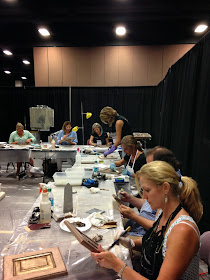There are times when layers are delicious
There are time when layers make you famous
And times when layers seem like the smartest way to go
Although in this case it is a toss-up.
Sure he is running almost naked in a blizzard but she is out pushing a baby in a blizzard.
Alas, in the world of faux finishing, the days of the wonderful 7-layer plus wall finish are few and far between. Your shoulder may be grateful but what about your wallet and your creativity? Delivering a finish in less steps doesn't mean you have to sacrifice a pretty, interesting finish for cost savings.
WELCOME TO TWO-LAYER TUESDAY!
Poor Tuesday. Not hated like Monday. No Happy Hump Day. Always TGIF, never TGIT.
For our Tuesday project, we are starting with a black background. Now our surface had random patterns over it that we needed to fill. Since we had an open container of Black Diamond Lusterstone, we used that to trowel as our base. But you could use Black Setcoat which is less expensive and easy to roll.
This is Layer One
Our next layer is made up of Lusterstone in this color palette.
The room is almost 300 square feet. I used two quarts of each color for this application. We will be using a Rough Rolled Lusterstone Technique. This is a good application method if your clients have a level three finished wall or less (that means not so smooth walls), visible plaster seams, tall walls. curved walls, or want several colors applied. It is easier to "stack" your colors then trowel them on in a smooth flat application (the colors will either blend too much or look too spotty).
I like to lead with my darkest color which is the Weathered Bronze. My sea sponge roller is damp and I coat it in the Weathered Bronze.
Don't smash the roller into the wall. Instead you want to "dance" on the wall.
See how Fred's feet just tap the wall? You want your roller head to do the same. Think of this as a Bounce and Roll motion.
Or Roll Bounce!
You should have spiky areas to your Lusterstone.
The roller may be used both horizontally and vertically.
The next color, Rhino, is applied in the same manner.
You will roll the colors wet into wet lapping areas.
Roll out about a 3'x3' area. Take your blade and hold it almost flat to the surface and lightly blade the plaster tips. Pull the blade across:
And up & down:
Use a Japan Blade to clean your trowel as you work. I butter the trowel with material cleaned from the blade and apply this to the ceiling line:
My goal it to work as efficiently as possible which means lessening the times I move myself or the ladder. Sorry these shots are so blurry. You try balancing on a ladder rung, holding a sharp blade and taking a cell phone picture. Any hoot! The finish at this stage looks really bad. Your client who is standing behind you will start in with, "that doesn't look like the sample!" Please feel free to insert ear buds at this time.
Now, we will finesse the finish. I butter my blade with the 3rd color-Frosted Denim. It is important to cover the blade so you avoid thick small blobs of color. This helps with color placement as well.
This color is popped into areas and gently bladed down.
I will also use this technique to add in more of my other two colors. The properties of Lusterstone allow me to work the colors wet into wet so I may finish my 3'x3' area before repeating the process in the next section. Because the application is so random I don't worry about dry or lap lines.
To complete a 300 square foot room, you would need 2 quarts of Black Setcoat and 2 quarts of each Lusterstone Color. Your product cost are about $231.00. That is .77 cents a square foot. Let's round that to .80cents to cover supplies. This finish should take 2 days to complete for this square footage: 1/2 a day to roll Setcoat (2 hour dry time) and the rest of the day and the next to apply to Lusterstone.
You have two layers so let's start out pricing at $2 a square foot. But the second layer is an artistic one and will take some time. I would price this Two Layer finish at $5.80 a square foot. $5 in labor and .80cents in materials. Your bid would be $1,740. You would make $1,500 for your labor or $93.75 an hour for 16 hours.
Sometimes less really is more!


.jpg)
.jpg)
.jpg)
.jpg)
.jpg)
.jpg)
.jpg)
.jpg)
.jpg)
.jpg)
.jpg)
.jpg)
.jpg)

















.jpg)






